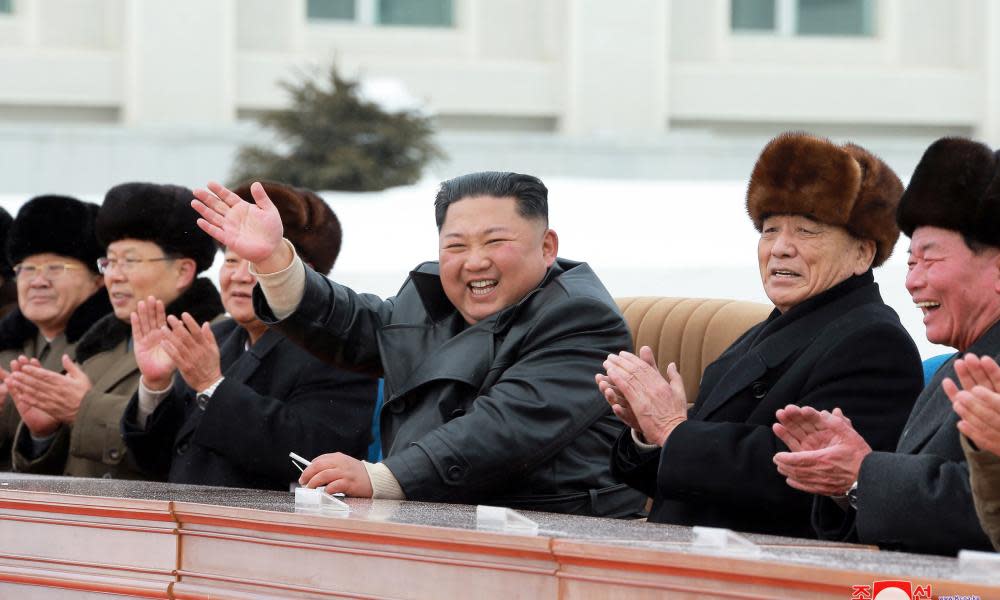North Korea says choice of 'Christmas gift' is up to US amid missile tensions

North Korea yesterday issued a thinly veiled warning it could resume long-distance missile tests in the next few weeks if the US does not change its negotiating position on the regime’s nuclear disarmament, saying “it is entirely up to the US what Christmas gift it will select to get”.
Related: North Korea's Kim Jong-un opens new city and 'socialist utopia' of Samjiyon
Ri Thae Song, the deputy foreign minister, said in a statement translated on the state news agency that the “year-end time limit” set for the US was “drawing nearer” and accused the Trump administration of playing for time in discussions with Pyongyang, in the hope of avoiding a standoff before US presidential elections in November.
“The dialogue touted by the US is, in essence, nothing but a foolish trick hatched to keep the DPRK [North Korea] bound to dialogue and use it in favour of the political situation and election in the US,” Ri said.
Joshua Pollack, the editor of the Nonproliferation Review, pointed out that Pyongyang has used the threat of a “gift” before, to refer to its first test launch of an intercontinental ballistic missile (ICBM) in 2017.
He said that Pyongyang also warned the Japanese prime minister, Shinzo Abe, that he could face “a real ballistic missile in the not distant future and under his nose”.
“They might not necessarily wait until the end of the year to show their displeasure on how the diplomacy with the United States has gone,” Pollack, a senior research associate at the Middlebury Institute of International Studies, said. “I wouldn’t be surprised to see an ICBM go over Japan on Christmas Day itself.”
Donald Trump is touting his summit diplomacy with Kim Jong-un as one of his signature foreign policy achievements. He points in particular to North Korea’s moratorium on testing nuclear warheads and ICBMs. An ICBM test over the holiday season would represent a significant blow as his re-election campaign moves into higher gear.
Speaking in London, where he is attending a Nato meeting, Trump played down the security concerns over the North Korean nuclear and missile programmes. When a journalist put it to him that Kim continued to developed both programmes, the president replied “You don’t know that”, even though it reflects the US intelligence consensus.
However, Trump did acknowledge that Kim had staged a series of short- and medium-range missile tests.
“He definitely likes sending rockets up, doesn’t he? That’s why I call him Rocket Man,” Trump said. He added: “Now we have the most powerful military we’ve ever had and we’re by far the most powerful country in the world. And, hopefully, we don’t have to use it, but if we do, we’ll use it.”
Trump said that at their first summit meeting in Singapore in June 2017, Kim had promised to “denuclearize”.
Related: House intelligence committee Democrats release Trump impeachment report – live
“I hope he lives up to the agreement, but we’re going to find out,” the president said.
In fact the Singapore agreement said “the DPRK commits to work toward complete denuclearization of the Korean Peninsula”. To North Korea, the denuclearization of the peninsula, signifies a gradual process of mutual disarmament that also involves the withdrawal of US strategic weapons from the region.
The difference in interpretations was papered over until the second summit in Hanoi in February 2018. The talks fell apart when Trump presented a plan requiring the wholesale dismantling of the North Korean nuclear and missile programmes in return for comprehensive sanctions relief. Kim wanted a step-by-step process.
Since the collapse of the Hanoi talks, Kim and his regime have issued repeated threats that North Korea could resume nuclear or ICBM testing if the US did not make more concessions or demand less of Pyongyang.
In his remarks in London, Trump hinted at possible concessions over its military deployment in South Korea, saying “it can be debated” whether the troop presence there was in US national security interests.
“I can go either way,” he said.

